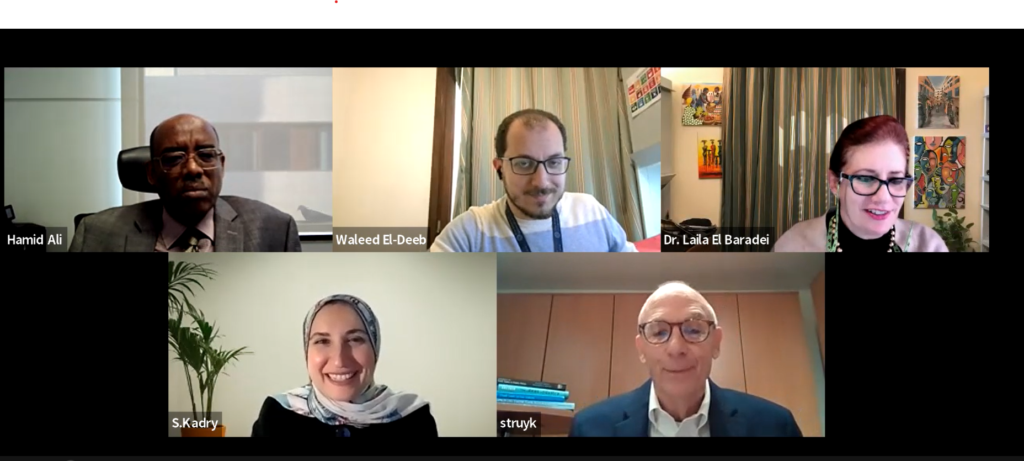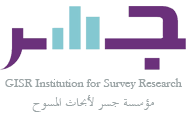GISR Institution for Survey Research in collaboration with The Public Policy Hub at the school of GAPP/AUC organized the webinar “Quality Control at Think Tanks: A Flexible Approach” on Monday 20th March 2023, from 4 P.M. – 6 P.M. Cairo time.
The webinar hosted Dr. Raymond Struyk*, Senior or Advisor, China Think Tank Research and Evaluation Center as a main speaker.
The presentation of Dr. Struyk was followed by a discussion by Dr. Laila El Bradie, Director of the Public Policy Hub at the school of GAPP/AUC, and Dr. Hamid Ali, Dean of the School of Public Administration and Development Economics (SPADE) at Doha Institute for Graduate Studies (DI).

The presentation during the webinar included the following points:
- Many programs exist more on paper rather than as operating systems. Data for 59 think tanks in transition and developing countries shows that only half had a written QC statement.
- The review process is documented in a written statement covering: 1.the range of products subject to review; 2.the general intensity of the review, perhaps varying for different author/product combinations; 3.the person responsible for designating reviewers and review intensity for each product to be reviewed; 4.form in which comments are to be provided; 5.process for resolving possible disputes between the reviewer and the author(s), and 6. Enforcement: how to assure reviews are done.
- Key qualification for reviewers is : the expertise to do the review – Methodological knowledge (e.g., statistical techniques used) – Policy/sector knowledge – In-house staff is generally preferred, but technical qualifications come first.
- The guiding principle is that all products are reviewed consistent with three factors: The product’s visibility and importance to the institute’s reputation – The author’s or presenter’s experience and the organization’s experience with a particular analyst – Whether the product to be reviewed is based on another one that has already been reviewed., e.g., reviewing a policy brief based on an approved technical report.
- Reviewers should look for in written reports (beyond technical proficiency): Consistency with Terms of Reference (TOR) – Clarity about what was actually done – All conclusions based squarely on the analysis and facts presented – Policy implications spelled out and supported by the analysis.
- Incidence of quality control weak systems is high, and it is caused by a combination of unrealistic review guidelines and poor oversight.
- Independent Think Tanks have more discretion over their publications, and they have the full authority to choose when to publish their results without having to get Government’s approvals.
Download webinar recording.
Download the webinar presentation
Download supplementary material to the presentation
Download the Book: Managing Think Tanks (In English)
Link to buy the Arabic version of the book: Managing Think Tanks
Link to buy the Book: Improving Think Tank Management: Practical Guidance for Think Tanks, Research Advocacy NGOs, and Their Funders
——————-
* Dr. Raymond Struyk holds a PhD in economics from Washington University in St. Louis. He has over 30 years of experience in developing and transition countries including Russia, Hungary, Indonesia, and Egypt.
For the past 25 years he has worked with think tanks on strengthening their management practices to improve their research quality and outreach effectiveness. He had a parallel career as a senior manager and policy analyst in the fields of social assistance, housing policy and mortgage finance and has extensive policy formulation and program evaluation experience.
Dr. Struyk is currently working as Senior Advisor at China Think Tank Research and Evaluation Center, Nanjing University, and a fellow at the Results for Development Institute.
Before that, he worked at several reputable think tanks and development institutions inside and outside the United States as an advisor and leader, including NORC at the University of Chicago, Chemonics International, and The Urban Institute. He has helped think tanks in several countries, in launching their operations, in addition to helping more than 60 think tanks in 20 transitional and developing countries in their capacity building efforts.
Dr. Struyk has published widely on housing, housing finance, and evaluation topics. His work today focuses primarily on think tank development. In addition to his articles on think tanks development, he has two books on this topic: his recent book, Improving Think Tank Management, published in June, 2015, and his earlier book are considered the “industry bible”: Managing Think Tanks: A practical guidance for maturing organizations.”
